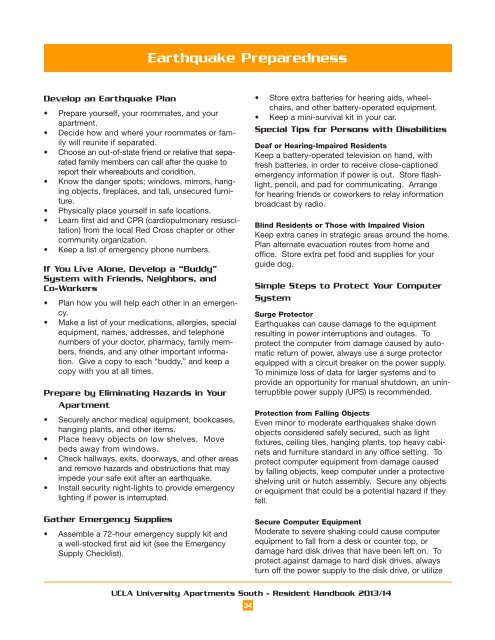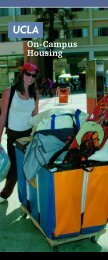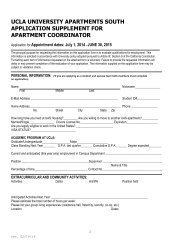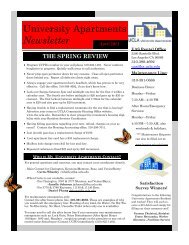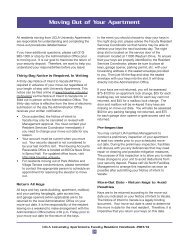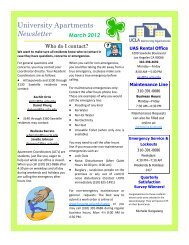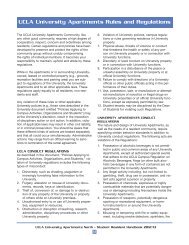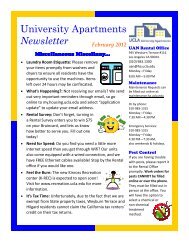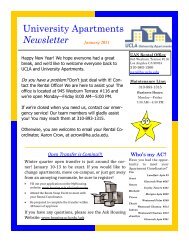Payment of Rent - UCLA - Housing
Payment of Rent - UCLA - Housing
Payment of Rent - UCLA - Housing
Create successful ePaper yourself
Turn your PDF publications into a flip-book with our unique Google optimized e-Paper software.
Earthquake Preparedness<br />
Develop an Earthquake Plan<br />
• Prepare yourself, your roommates, and your<br />
apartment.<br />
• Decide how and where your roommates or family<br />
will reunite if separated.<br />
• Choose an out-<strong>of</strong>-state friend or relative that separated<br />
family members can call after the quake to<br />
report their whereabouts and condition.<br />
• Know the danger spots; windows, mirrors, hanging<br />
objects, fireplaces, and tall, unsecured furniture.<br />
• Physically place yourself in safe locations.<br />
• Learn first aid and CPR (cardiopulmonary resuscitation)<br />
from the local Red Cross chapter or other<br />
community organization.<br />
• Keep a list <strong>of</strong> emergency phone numbers.<br />
If You Live Alone, Develop a “Buddy”<br />
System with Friends, Neighbors, and<br />
Co-Workers<br />
• Plan how you will help each other in an emergency.<br />
• Make a list <strong>of</strong> your medications, allergies, special<br />
equipment, names, addresses, and telephone<br />
numbers <strong>of</strong> your doctor, pharmacy, family members,<br />
friends, and any other important information.<br />
Give a copy to each “buddy,” and keep a<br />
copy with you at all times.<br />
Prepare by Eliminating Hazards in Your<br />
Apartment<br />
• Securely anchor medical equipment, bookcases,<br />
hanging plants, and other items.<br />
• Place heavy objects on low shelves. Move<br />
beds away from windows.<br />
• Check hallways, exits, doorways, and other areas<br />
and remove hazards and obstructions that may<br />
impede your safe exit after an earthquake.<br />
• Install security night-lights to provide emergency<br />
lighting if power is interrupted.<br />
Gather Emergency Supplies<br />
• Assemble a 72-hour emergency supply kit and<br />
a well-stocked first aid kit (see the Emergency<br />
Supply Checklist).<br />
• Store extra batteries for hearing aids, wheelchairs,<br />
and other battery-operated equipment.<br />
• Keep a mini-survival kit in your car.<br />
Special Tips for Persons with Disabilities<br />
Deaf or Hearing-Impaired Residents<br />
Keep a battery-operated television on hand, with<br />
fresh batteries, in order to receive close-captioned<br />
emergency information if power is out. Store flashlight,<br />
pencil, and pad for communicating. Arrange<br />
for hearing friends or coworkers to relay information<br />
broadcast by radio.<br />
Blind Residents or Those with Impaired Vision<br />
Keep extra canes in strategic areas around the home.<br />
Plan alternate evacuation routes from home and<br />
<strong>of</strong>fice. Store extra pet food and supplies for your<br />
guide dog.<br />
Simple Steps to Protect Your Computer<br />
System<br />
Surge Protector<br />
Earthquakes can cause damage to the equipment<br />
resulting in power interruptions and outages. To<br />
protect the computer from damage caused by automatic<br />
return <strong>of</strong> power, always use a surge protector<br />
equipped with a circuit breaker on the power supply.<br />
To minimize loss <strong>of</strong> data for larger systems and to<br />
provide an opportunity for manual shutdown, an uninterruptible<br />
power supply (UPS) is recommended.<br />
Protection from Falling Objects<br />
Even minor to moderate earthquakes shake down<br />
objects considered safely secured, such as light<br />
fixtures, ceiling tiles, hanging plants, top heavy cabinets<br />
and furniture standard in any <strong>of</strong>fice setting. To<br />
protect computer equipment from damage caused<br />
by falling objects, keep computer under a protective<br />
shelving unit or hutch assembly. Secure any objects<br />
or equipment that could be a potential hazard if they<br />
fell.<br />
Secure Computer Equipment<br />
Moderate to severe shaking could cause computer<br />
equipment to fall from a desk or counter top, or<br />
damage hard disk drives that have been left on. To<br />
protect against damage to hard disk drives, always<br />
turn <strong>of</strong>f the power supply to the disk drive, or utilize<br />
<strong>UCLA</strong> University Apartments South - Resident Handbook 2013/14<br />
34


